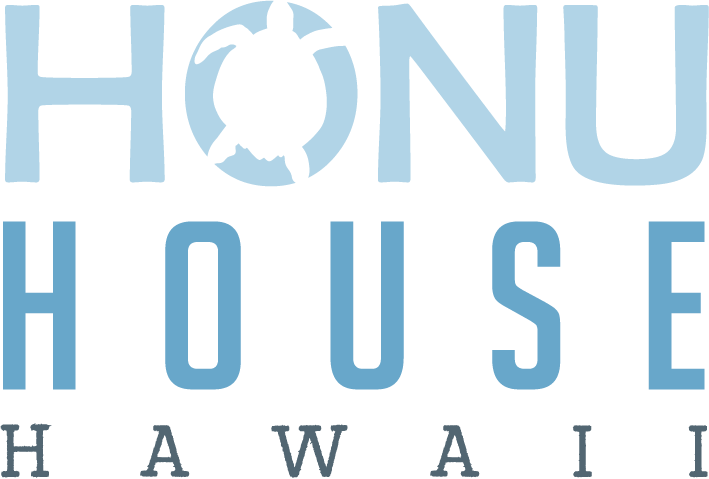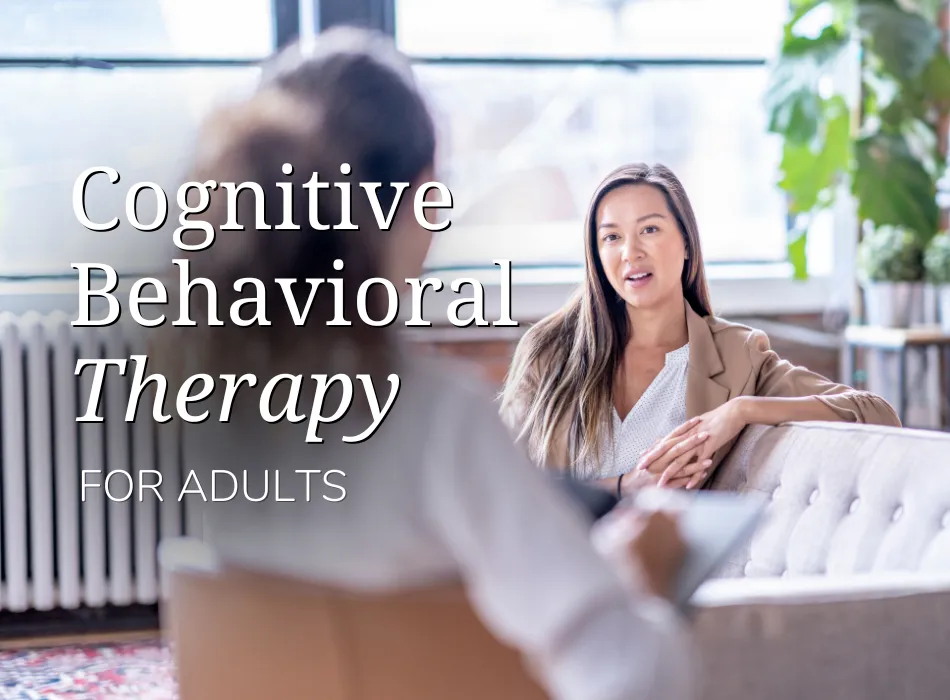
How Cognitive Behavioral Therapy Helps in Addiction Treatment
Addiction is a serious issue that affects millions of people worldwide. It can negatively affect an individual’s physical, emotional, and mental health, relationships, and career.
Thankfully, there are effective treatments available to help individuals recover from addiction. One such treatment is Cognitive Behavioral Therapy (CBT). CBT is a highly effective therapy for addiction recovery, particularly in adults.
What is Cognitive Behavioral Therapy (CBT)?
Cognitive Behavioral Therapy (CBT) is a type of talk therapy that focuses on identifying and changing negative thoughts, behavior patterns, and beliefs. CBT aims to help individuals learn coping skills to manage their negative thoughts and emotions and to develop new, more positive behavior patterns. CBT is a goal-oriented, short-term therapy that lasts 12-16 weeks.
CBT includes various techniques and strategies, such as cognitive restructuring, exposure therapy, and behavioral activation. Cognitive restructuring involves identifying and challenging negative thought patterns and replacing them with more positive, realistic thoughts.
Exposure therapy involves gradually exposing individuals to situations that trigger their anxiety or negative emotions. This allows those suffering to develop coping skills to manage them. Finally, behavioral activation involves identifying and engaging in positive, rewarding behaviors that can improve an individual’s mood and overall well-being.
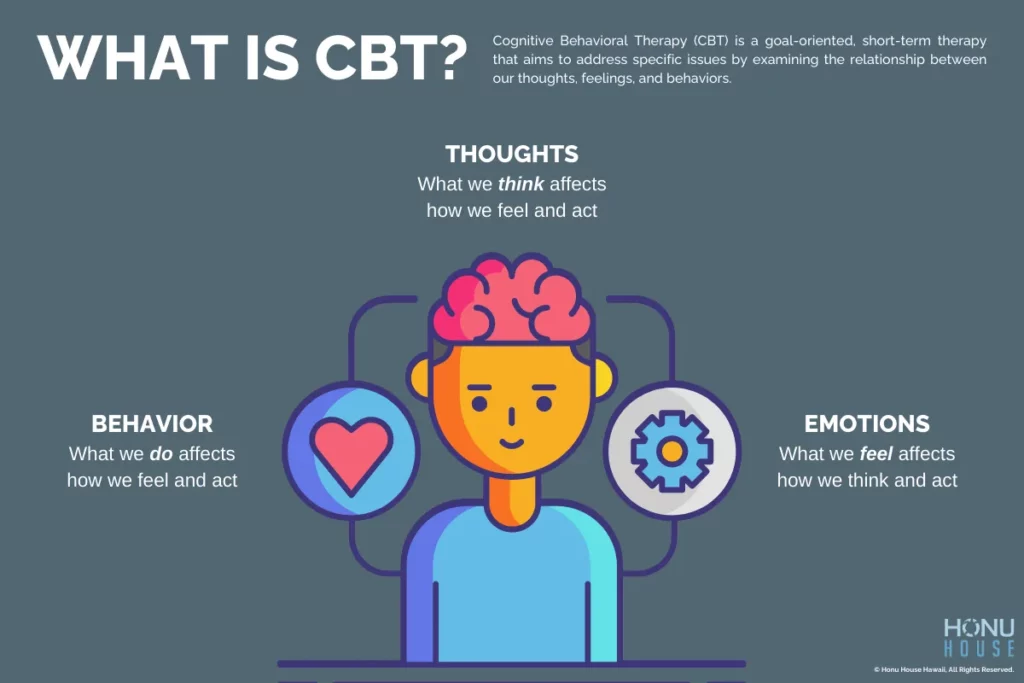
How CBT Helps with Addiction Recovery
CBT is particularly effective in treating addiction because it addresses the underlying thought patterns and behaviors contributing to addictive behaviors. For example, addiction often stems from negative thought patterns and beliefs, such as feelings of low self-worth or confidence that the individual cannot cope with stress or difficult emotions.
CBT helps individuals to identify and challenge these negative thought patterns, replacing them with more positive, realistic thoughts. This therapy, in turn, can lead to more positive behavior patterns, such as developing healthy coping skills to manage stress and difficult emotions.
CBT effectively treats various addiction types, including drug and alcohol addiction, gambling addiction, and sex addiction. It has also effectively treated co-occurring mood disorders and mental health conditions like anxiety, eating disorders, and Attention Deficit Hyperactivity Disorder (ADHD).
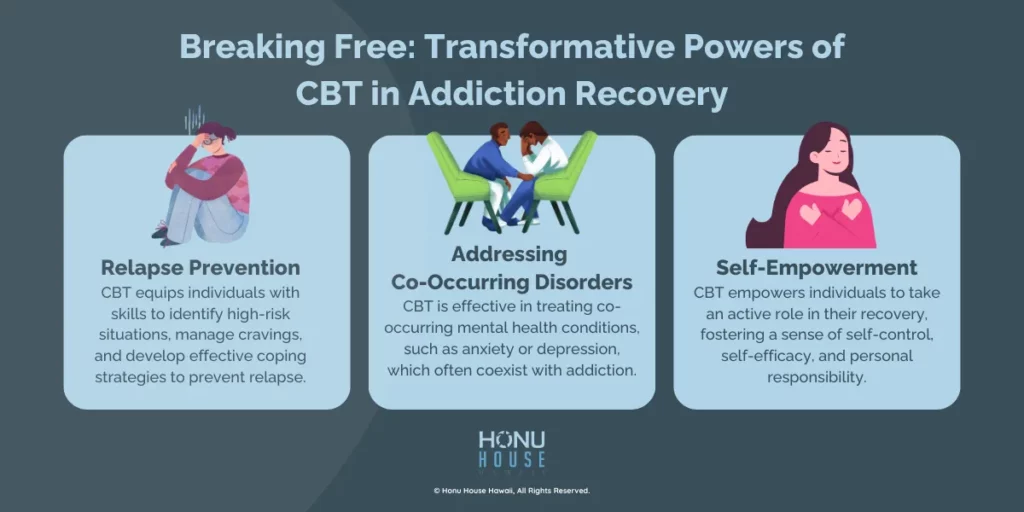
What to Expect During a CBT Session
During a Cognitive Behavioral Therapy (CBT) session, individuals can expect to work with a trained CBT therapist who will guide them through the therapy process. CBT is an evidence-based form of therapy that has been proven effective in treating various mental health conditions, including addiction. CBT therapists are trained to help individuals identify negative thought patterns and behaviors and to develop new, more positive behavior patterns. In addition, they will work with individuals to set goals and develop strategies.
CBT sessions typically last 50-60 minutes and are conducted weekly for 12-16 weeks. However, the duration and frequency of sessions can vary depending on the individual’s needs and the severity of their condition. The first session will typically involve an assessment where the therapist will gather information about the individual’s medical history, current symptoms, and treatment goals.
CBT is tailored to meet individual needs, and CBT therapists will work with individuals to identify their unique needs and goals.
Then, they will develop a personalized treatment plan to address those needs. These treatment plans include specific CBT techniques such as cognitive restructuring, exposure therapy, or behavioral activation. CBT therapists will also provide support and encouragement throughout the therapy process, helping individuals stay motivated and focused on their recovery.
Some of the things that individuals can expect during a CBT session include:
- Discussion of current symptoms and concerns
- Identification of negative thought patterns and behaviors
- Development of coping strategies and problem-solving skills
- The practice of new, more positive behavior patterns
- Homework assignments to reinforce the skills learned in therapy
CBT is a goal-oriented and structured therapy tailored to individual needs. It is conducted by trained CBT therapists who guide individuals through the therapy process, helping them to identify and challenge negative thought patterns and behaviors.
If you or a loved one is struggling with addiction or a mental health condition, seeking professional help from a CBT therapist can be the first step toward recovery.
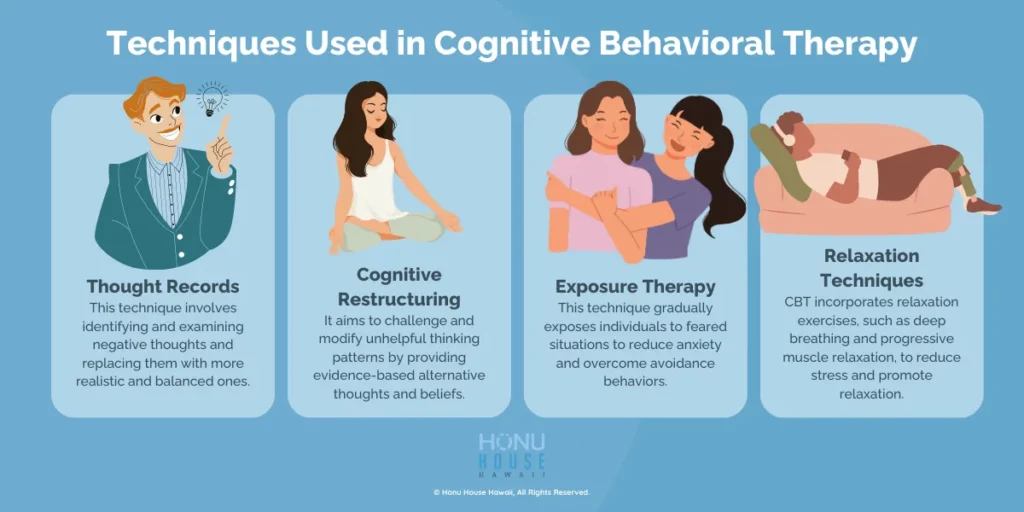
Daily 10-minute Cognitive Behavioral Therapy At Home
Performing Cognitive Behavioral Therapy (CBT) at home can significantly supplement professional treatment for Substance Abuse Disorder (SUD). Here are some steps to follow to achieve a 10-minute CBT session at home:
Identify your negative thoughts: Pay attention to your thoughts throughout the day and write down any negative reviews that come to mind. These thoughts can be about yourself, others, or the world.
Challenge your negative thoughts: Once you have identified them, challenge them. First, ask yourself if they are based on facts or assumptions. Then, challenge the validity of the thoughts and look for evidence to support or refute them.
Replace negative thoughts with positive ones: After challenging your negative thoughts, replace them with more positive, realistic ones. Then, please write down the new thoughts and repeat them to yourself throughout the day.
Practice coping skills: Develop coping skills to help you manage negative thoughts and emotions. These can include deep breathing, progressive muscle relaxation, or visualization.
Set goals: Set realistic goals for yourself that are aligned with your values and that you can work towards. These goals can be short-term or long-term and can help you stay motivated.
It is important to note that CBT should be performed at home while undergoing professional treatment for Substance Abuse Disorder (SUD). CBT is just one aspect of a comprehensive treatment plan that should be overseen by a licensed therapist or medical professional. If you or a loved one is struggling with addiction, seeking professional help is the first step toward recovery.
Finding a CBT Therapist
Finding a qualified Cognitive Behavioral Therapy therapist is crucial. A CBT therapist can support and guide individuals struggling with addiction or a co-occurring mental health condition. They can help overcome negative thought patterns, behaviors, and emotions contributing to addiction. If you or a loved one requires a qualified CBT therapist, Honu House Hawaii is here to help.
At Honu House Hawaii, we have a team of licensed and experienced therapists specializing in Cognitive Behavioral Therapy (CBT). Our CBT therapists are trained to help individuals challenge negative thoughts and behaviors, replacing them with more positive and realistic ones. We also guide the development of coping skills to manage negative emotions and behaviors that contribute to addiction.
Search online directories such as Psychology Today or GoodTherapy.org to find a qualified CBT therapist near me.
When looking for a therapist, it is essential to ensure they are trained and experienced in CBT techniques. Furthermore, they have experience working with individuals with addiction or mental health issues. At Honu House Hawaii, our CBT therapists have years of experience. They specialize in working with individuals struggling with addiction and co-occurring mental health conditions, ensuring you receive the highest quality of care.
In addiction recovery, seeking professional help is the first step toward long-term recovery. At Honu House Hawaii, we provide comprehensive treatment plans tailored to meet each individual’s unique needs. Our therapists and medical professionals work together to ensure our clients receive the support and care needed to achieve lasting recovery. Contact us today to learn more about our CBT therapy and other evidence-based treatment programs.
Honu House Hawaii: A Rehab Facility That Offers Cognitive Behavioral Therapy For Adults
Honu House Hawaii, a leading rehab facility, serves as a center for Cognitive Behavioral Therapy (CBT) for adults facing addiction and co-occurring mental health conditions. Honu House Hawaii is located in beautiful Hawaii, providing a serene and peaceful environment for individuals to focus on their recovery. Our team of licensed therapists and medical professionals is dedicated to providing individualized care tailored to meet each individual’s unique needs.
At Honu House Hawaii, we believe in a holistic approach to addiction recovery. Therefore, in addition to CBT, we offer a range of evidence-based therapies.
Therapies such as Dialectical Behavioral Therapy (DBT), Mindfulness-Based Cognitive Therapy (MBCT), and Eye Movement Desensitization and Reprocessing (EMDR) are the most well-known kind used. We also provide medical detox services, psychiatric evaluations, and medication management to ensure our clients receive comprehensive care.
Our treatment programs are designed to help individuals achieve long-term recovery by addressing the underlying issues contributing to addiction. Our CBT-based treatment programs help individuals develop coping skills to manage negative thoughts and emotions, develop healthy behavior patterns, and build a robust support system to sustain them through their recovery journey.
Conclusion
Addiction can be a devastating disease that can have long-lasting negative consequences on an individual’s life. However, Cognitive Behavioral Therapy (CBT) is a highly effective form of therapy for addiction recovery, particularly in adults. CBT helps individuals identify and challenge negative thought patterns and behaviors, replacing them with more positive, realistic ones. This, in turn, can lead to improved mental health and overall well-being.
If you or a loved one is struggling with addiction or a co-occurring mental health condition, it is crucial to seek professional help. Honu House Hawaii is a leading rehab facility that offers Cognitive Behavioral Therapy (CBT) and other evidence-based therapies to help individuals achieve long-term recovery. Contact us today to learn more about our programs and how we can help you recover.
Frequently Asked Questions
What is CBT?
Cognitive Behavioral Therapy (CBT) is a type of talk therapy that focuses on identifying and changing negative thoughts, behavior patterns, and beliefs.
How does CBT help with addiction recovery?
CBT helps individuals to identify and challenge negative thought patterns, replacing them with more positive, realistic thoughts. This therapy, in turn, can lead to more positive behavior patterns, such as developing healthy coping skills to manage stress and difficult emotions.
What addiction types can CBT effectively treat?
CBT effectively treats various addiction types, including drug and alcohol addiction, gambling addiction, and sex addiction.
What should I expect during a CBT session?
During a CBT session, individuals can expect to work with a trained CBT therapist who will guide them through the therapy process. CBT sessions typically last 50-60 minutes and are conducted weekly for 12-16 weeks.
Can I perform CBT at home?
Yes, performing Cognitive Behavioral Therapy (CBT) at home can significantly supplement professional treatment for Substance Abuse Disorder (SUD). However, it should be performed while undergoing professional treatment and overseen by a licensed therapist or medical professional.
How do I find a CBT therapist?
Finding a qualified CBT therapist is crucial. You can ask for recommendations from your healthcare provider, search online for local therapists, or contact a mental health clinic or hospital for assistance.
-

-
June 16, 2023
